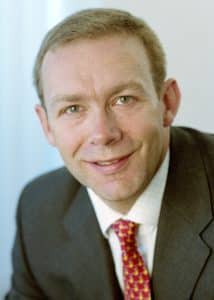Posted on: 12.11.2024
Our head of Global Corporate Affairs, Katie Simpson, recently sat down with George Eykyn, Corporate Affairs Director of Southern Water, a major brand in the water industry that’s implementing a turnaround plan.
George shared his unique insight into the evolving role of communications in the utility sector, the challenges of water scarcity, and the future of corporate affairs.
Read the full interview below.

What do you see as the key role of the Chief Communications Officer going forward?
In a nutshell, it’s about stewarding the reputation of the organisation, ideally as a member of the executive team. You will usually be reporting to the chief exec, ensuring they’re aware of relevant external and stakeholder perspectives, and the risks and opportunities associated with what the organisation is doing; how might it best be communicated, what does it look like to stakeholders, and how might it play out.
In the water and utilities space, for example, we face a wide range of campaigners and critics, and we regularly need to communicate on challenging topics – for example, why customer bills will need to go up in the coming years; what infrastructure we’re going to need in future; why some big-ticket issues can’t be resolved overnight; and how customers can help by saving water in their own home.
It’s the senior communications leader’s job to spot the risks, make the connections, and plan a strategy informed by where different key stakeholders sit on different issues. And it’s not easy!
How important is it that the CCO sits on the executive team?
A direct relationship with the CEO is hugely beneficial – and it’s important to command a voice at the Exec table. If you sit on the Exec, you are not there just as the senior comms person, but as one of a team of people leading the business. You should be doing far more than is defined by wearing the comms or corporate affairs “hat”.
As a comms leader, you’re there to provide an external perspective in the formative stages of a discussion. You aren’t simply the recipient of communications commissions from the top table — you have a chance to shape things.
Added to that, the nuances of how your CEO communicates are important. If you don’t have a strong, close, working relationship with your CEO, it’ll be really hard to do a good job of adequately reflecting their persona, their tone, or their priorities.
So, what key qualities are going to become more important from communications leaders as we move into 2025 and beyond?
A lot of this hasn’t – and won’t – change. You need to be a good team leader able to run a high-performing function with excellent routines. You have to be able to hire good people. And you have to be able to build strong working relationships.
On top of this, it’s important to have good judgement, not just about potential risk, but about potential opportunity, too.
And finally, you have to be able to balance reactivity and proactivity. If all you do is spend your day putting out fires and trying to defend, you’re not going to move the dial anywhere significant.
Let’s talk specifically about Corporate Affairs professionals now. What skills do you expect will be in high demand over the coming months and years?
Digital literacy is a huge one. And on top of that, AV skills are increasingly going to be expected. In our business, we’re trying to encourage our team members to pitch in, film user-generated content, and contribute their own videos or stills to our external and internal comms. The ability to write, crisply and accurately, is rarer than people think and something I always look to test during recruitment.
A collaborative, integrated mindset will also help candidates stand out. We want our corporate affairs professionals to think beyond their own sub-function – so, for example, press officers think about how the story might be activated on digital and social channels; and someone posting interesting content to social media also thinks about exploiting it properly on internal channels.
And, looking at hiring practices, do you see employee/candidate demands changing?
I do. I think there’s a lot more emphasis on development now. Candidates want to know, is this a company that will allow me to grow? And are there real opportunities for me here? I see people asking these questions at the interview stage more and more.
Inclusivity and diversity are also really important. Candidates want to know that the company they’re going to show up for is diverse, inclusive, and welcoming. They will often probe the company’s purpose; whether the business is behaving in a way that’s sustainable, responsible, and is it committed to these principles, rather than seeing ESG perhaps as compliance reporting. Candidates often probe these topics, and the company’s culture, when I interview them.
With that in mind, what ESG strategies should leaders be looking to adopt?
The trick is to see the ESG agenda as a mindset and a core part of the business’ decision-making, not just a reporting discipline that has to be ticked off each year. Sustainability and responsible business needs to underpin everything you do, from the top-level initiatives to planning car-sharing for corporate events.
Any final thoughts?
Communications and corporate affairs professionals in the water industry are operating in a dynamic, changing environment which will evolve further as we move into 2025 and the new government seeks to oversee radical change throughout the sector. The working environment is complex; it requires communicators who work in an integrated way and are resilient, with stomach for the challenge ahead and realism that shifting reputations in our industry is going to be a long haul – a strategic task coloured in particular by customers’ experiences of how we serve them. It’s a big goal, but it will deliver value to the public, and the journey will be exciting!

 enquiries@hansonsearch.com
enquiries@hansonsearch.com